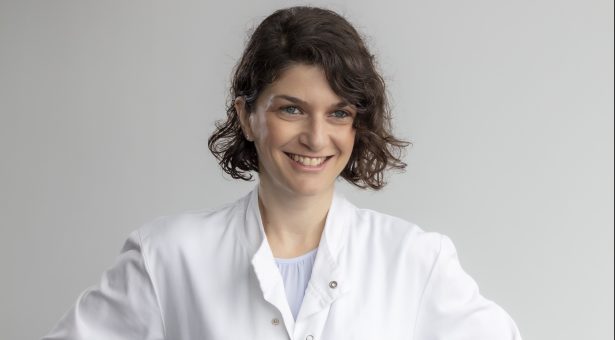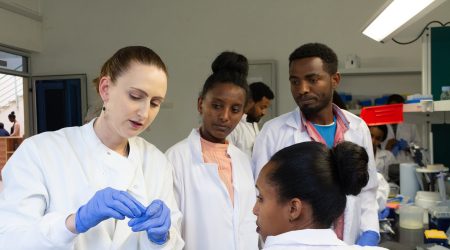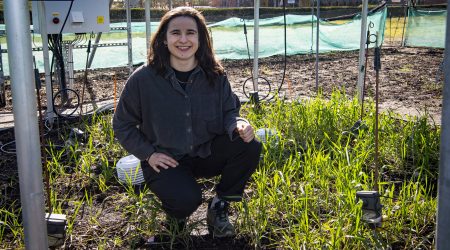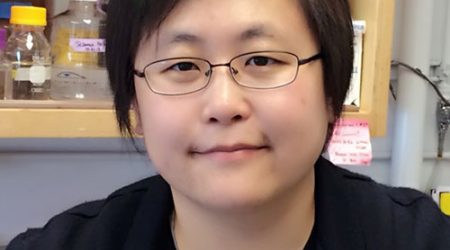Introducing Rosaria Campilongo: Going outside the comfort zone to find inspiration.

International Women’s Day is a global celebration of the social, economic, cultural, and political achievements of women. Here Dr Rosaria (Ros) Campilongo, CEO of PfBIO a John Innes Centre spin-out company based at Norwich Research Park, takes time out of her busy day to give some inspiring thoughts on work, life, and balance.
Ros is a familiar face for visitors to the Norwich Research Park (NRP) Centrum building, as she is one of several scientists featured in promotional posters that welcome you to this busy entrepreneurial science hub.
Asked what it is like to see yourself on these banners, Ros says, “My first thought was that this is a bit cheesy to see my face everywhere, and that there are more inspirational people than me,”
“However, to grow, it’s good to go out of your comfort zone. You must promote yourself and your business and you must believe in yourself and your values.”
So, how does someone from southern Italy with a love of friends, family, culture and cuisine and a passion for creative writing end up running a biotech start-up in the East of England? “I like challenges,” answers Ros.
A busy diary of promotional and engagement activities shows that she has embraced this mantra: over the past few weeks Ros has been a guest at a sixth-form college careers day, been interviewed on a podcast for entrepreneurs, and had commitments as a one-to-one mentor.
She also has plans to set up her own podcast to interview other women in science from across the Norwich Research Park.
Her company PfBIO produces bacteria-based products to promote plant health and protect crops from major agricultural diseases in an environmentally sustainable way.
The company has developed a platform called BioSIFT which helps to identify natural biocontrol bacteria for the creation of their bioproducts. Bacteria are collected from the natural environment and then selected for their ability to antagonize plant pathogens, protect crops, improve crop yield, and soil quality.
However, Ros’ career could have gone in a quite different direction: “When I was 18 or 19, I was undecided which career path to take because I love writing. I was the best in class at school and my dream was to write a book, perhaps a romance novel.”
In the end, she chose biological sciences, because: “I like to understand how things work, to discover what are the underlying mechanisms and that is why I chose molecular biology.”
Her scientific skills were honed during a two-year post-doctoral role in the Malone group at the John Innes Centre, studying the regulation of genes that allow Pseudomonas bacteria to adapt to changes in nutrient availability.
“I enjoyed the project. It was a nice story, highly detailed. I worked hard to understand things and you can lose yourself in the details. I always try to enjoy the journey whatever I am doing – in that case, it was understanding that system and that is what I did, I was very happy.”
The postdoctoral research journey led to a career crossroads that is familiar to thousands of talented researchers who down the years have passed through the gates of research institutes like the John Innes Centre: to stay in academia or to head into the commercial world.
For Ros, a bridge between academia and business came in the form of a research job with an AgriTech company Folium Science. This gave her the experience she needed to go for it when the chance came to run a business of her own.
Ros cites career limiting factors for women in her chosen area: “According to the Government Equalities Office, women make up about 30% of people in STEM. One of the work barriers that women face is caring with respect to children and elderly relatives., In my experience, I have not come across many mothers in leadership positions. It’s a real issue.”
“But I like to challenge myself. That is why I decided to start a business.”
“Everyone says I am very courageous but, in the end, I feel there is nothing to lose. There is a fear of leaving academia, it makes you feel like a failure. But the reality is that academia is not the only scientific environment where you can apply your skills and create value.
“When I started the company, my goal was to learn from the experience. This is what I have been doing for the past two years.”
New skills include pitching to the Dragon’s Den of fundraising; Ros recently attended the Halo Programme, organized by the Anglia Capital Group (AGC) and presented her business expansion plans before a panel of Angel Investors from AGC.
This secured a £75,000 investment and brings the total, which Ros has raised for her business over the past two years, to £320,000.
“In this pitch experience I was out of my comfort zone because I had to learn so much. Including a lot of financial skills in a short time, how to prepare the pitch, how to do market research, finance projections, and company value evaluation. I was very stressed, but in the end, you see the huge progress made on the company’s business plan and my presentation skills.”
The transition over the past two years from life in the lab, to CEO, brings a new perspective, a new career direction with PfBIO. So how is life now?
“I love it, I really love it. This is another chapter of my life and I love science even more now. . I have an opportunity to share with the world a solution to a problem, and how that and that can contribute to the farming economy and improve the environment.”
Maintaining a strong work-life balance is part of the healthy picture. Ros is mother to a two-year-old daughter and has a long list of hobbies and interests, which she pursues with zeal including playing tennis and the violin. Lessons in improvised drama have also been part of her busy curriculum, and a big help in developing her already excellent English language skills.
To cap it all she also works part-time as a Knowledge Exchange and Impact Officer at the John Innes Centre.
So how does she balance this busy life? “It’s very challenging, but it’s possible. It’s necessary to work at balancing your professional and personal life. Time management, consideration, and prioritizing what is important.” she says. “I have always been efficient, and now I am super-efficient.”
“If I did not keep this balance, life would be very difficult. Being a mother changed everything for me.”
The theme of International Women‘’s Day 2024 is to “Inspire Inclusion”, reflecting on the personal and professional journey of the past two years Ros says,
“In the beginning, I was intimidated by the perception of the business environment maybe because I’m a woman, I’m short, and looked younger than my age. I thought people were not taking me seriously.”
“You may feel like you have “impostor syndrome” in these situations and I certainly did, but I don’t get that anymore. The message I want to share is, don’t be afraid to explore and go out of your comfort zone, because it’s there that you can grow and learn.”



